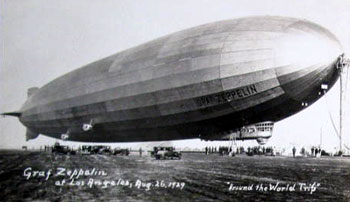Response to the First Round the World Trip by Graf Zeppelin 1929
THE THRILL ALL GERMANY FELT when the Graf Zeppelin completed its round-the-world voyage, which is described by some German editors as "the most famous voyage since Magellan's," was somewhat spoiled by the envious and grudging tone displayed in certain sections of the foreign press.
So thinks the Berlin Kreuz Zeitung, which is quite down in the mouth because it noticed a lack of enthusiasm among English newspapers for the Graf's great achievement. This Berlin daily feels aggrieved that they took this feat as if it were a second-rate performance. The explanation is, we are told, that the English intend to send airships of their own around the world soon, and are afraid to expend energy or enthusiasm in rejoicing over the Graf's voyage. As for the Polish press, the Kreuz Zeitung hands out this slap:

"The Polish press naturally interpreted the east Asiatic trip of
the Graf Zeppelin as a piece of
propaganda to promote the German penetration of the Eastern
world. It was pointed out in
Poland that this airship voyage
was undertaken just when there
were international complications
throughout Asia. It was also
highly significant to the Polish
press that Eckener, despite the
permission he got to sail elsewhere,
chose to fly over Poland along the
traditional line of German expansion : Danzig-Koenigsberg-Lithuania. That is the military course
to Russia.
"A hint that the airship had
to go over mountains and hills
as well as natural features little
studied in detail, led the Polish
press to manufacture its misinterpretation that the Zeppelin did
not stick to the usual roads of
aerial flight but strove to measure
heights, to plumb depths, to seek fresh paths and courses unexplored. One Polish paper even criticizes the Zeppelin for flying
in the full panoply of war, a circumstance pointing, it says, to
the 'real purpose' of the trip! The navigation of the air over
Poland's coast line is termed a diplomatic provocation."
But the envy of the British and the jealousy of the Poles do not surprize the Hamburger Nachrichten, because Germany, it fears, does not know how to make any use of her assets in the air, to say nothing of her assets on solid ground:
"Once we were a nation of thinkers and poets, and as such
renowned and celebrated and sung during a period of our might.
To-day we build the swiftest ocean ships, a marvel of technical
efficiency. A German airship flies over all the waters of the
wide world or over the oceans, at any rate. How speedily it
covered the distance between Berlin and Tokyo and then onward! Thus the nation of poets and thinkers subdues space
and time, precisely at the period of its deepest diplomatic degradation. A hundred years ago German culture attained a height
that was the greatest in its history. Then the army and the
government services absorbed the pick of the German people.
To-day the choice spirits of the land are technically efficient,
masters of the engine. But diplomacy?
"German dreamers! Time and space we subdue. The powers of Nature are tamed for our service, but our place in the sister-hood of nations we do not know how to keep. A strange people!"
In France, the Paris Figaro is cordial in its praise of German skill and inventiveness in the field of the air, and it records ungrudgingly the triumphal reception accorded the Graf at Friedrichshafen after its return. Especially, this Paris daily admires the diligence and tenacity of effort characteristic of the Germans, and it urges the French to imitate them in this respect. But, it adds:
"The voyage of the Zeppelin was not merely a sporting enterprise. All the echoes that reach us from Germany through the
German press indicate as a certainty that its mission was to
spread German propaganda and prestige the world over.
"Moreover, it has come to the knowledge of the French press
that Germany purposes to build along the Rhine, in the demilitarized zones, whose demilitarization is a vital necessity for our
security, hangars for Zeppelins and landing ports. Now, the
Treaty of Versailles is explicit on this point. The aim of the
Reich, which in the matter of air navigation has infringed the
obligations of the treaty, is designed at nothing less than to
obtain from us, under pretext of sport and of commerce, the
right to build at our very doors an air fleet that the authors of
the Treaty of Versailles had every good reason to prohibit—
and every one knows why."
Source: Literary Digest - October 5, 1929

